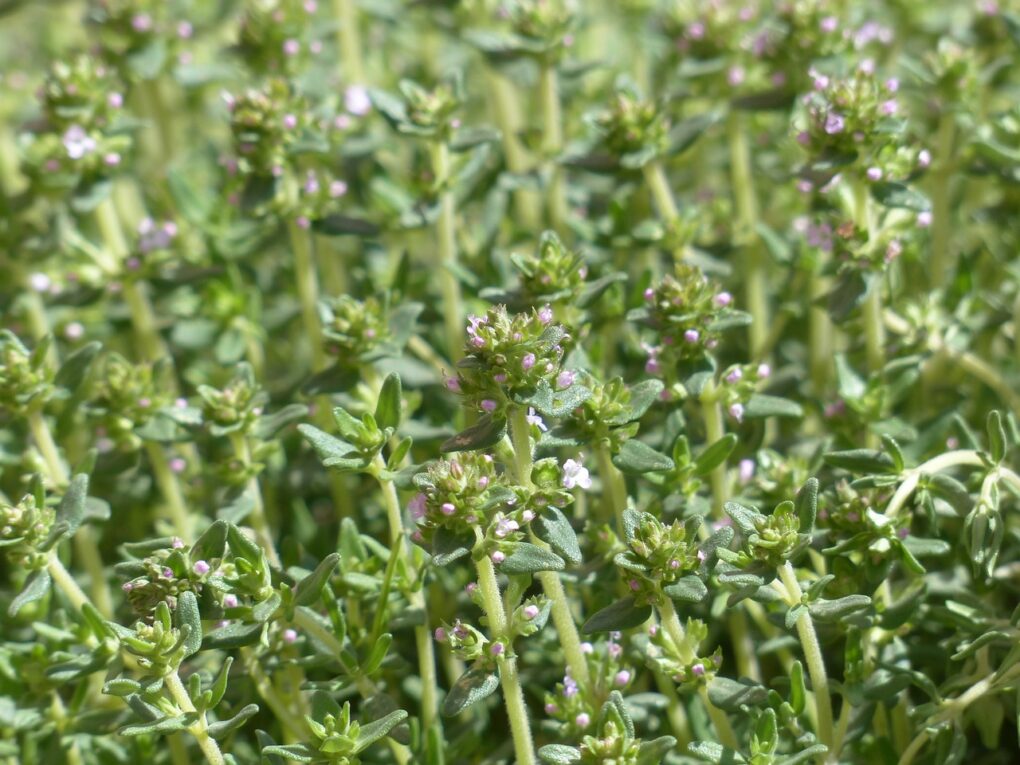Thyme is of the genus Thymus, most commonly Thymus vulgaris or Common Thyme. It is a fragrant and flavorful herb that belongs to the mint family (Lamiaceae) and is native to the Mediterranean region. It is known for its small, gray-green leaves and delicate purple or white flowers. Thyme has been used for culinary, medicinal and ornamental purposes for centuries.
Species of Thyme
Approximately 350 species of Thyme exist. Some of these species are good plants for gardening and possess a sweet fragrance and pretty lilac or pink flowers. Despite the fact that the flowers are quite small, there are many of them which produce nectar and therefore attract bees. Some of the most flavourful honey can be obtained from the nectar of thyme.
The plants are perennial and belong to the family of Mint. They also exist in several different colours and shapes. The flowers of the plant range from pale pink, blue-violet, magenta, lilac, mauve, and white while the leaves vary in shades of green as well as bronze and silver.
The vast range of differences between each of the plants makes them each unique. As such, there are a number of different names for the various thyme types which include; Rainbow Falls, Archer’s Gold, Golden King, Goldstream, Silver Posie, Silver Queen and Lemon Curd. All of these plants have different scents which can generate aromas such as; camphor, lemon, orange, celery, tangerine, caraway, pine, as well as eucalyptus. The different flavours and aromas are due to the subtle differences in the essential oils within the plant.
Thyme is a highly fragrant and pleasant plant to grow within a garden. They are small in size which makes them easy to plan in small spaces such as in rock gardens, small pots, and in between paving stones. They can be used in order to repel cabbage pests and beetles. In order to ensure that they grow well, it is best to trim the plant after they flower and remove any of the dead flowers.
Culinary Uses of Thyme
In cooking, thyme is prized for its strong, aromatic flavor, which is slightly earthy, peppery and slightly minty. Lemon Thyme and Common Thyme (Thymus vulgaris) are the most common forms of thyme that are used in cooking. The herb gives the food a tangy and warm flavor, similar to camphor, and is able to retain its strong flavor even after cooking. It can also be used within marinades as well as stuffings.
The dried or fresh leaves of the thyme plant, along with the flowers, can be used within; stews, soups, roasted meats, sautéed or baked vegetables and sauces.
Thyme pairs well with other herbs such as; rosemary, sage and parsley. It is a staple ingredient in many cuisines around the world, including; Mediterranean, French and Middle Eastern cuisines.
Historical Uses of Thyme
Thyme has been well-used for centuries for a variety of purposes. People in Ancient Rome used thyme in order to treat melancholy and added the herb to alcoholic beverages and cheese. The Ancient Greeks would use thyme in incense. During medieval times, the herb was used to promote vigour and courage.
Medicinal Use of Thyme
Thyme is also used for medicinal purposes, with the most common types used being Spanish Thyme, Common Thyme and Creeping Thyme. All of these types are indigenous to Western Asia and Europe, although they are cultivated throughout the world.
Thyme has a long history of use in traditional medicine. It is rich in antioxidants, vitamins and minerals. It also contains compounds such as thymol, carvacrol and rosmarinic acid which are believed to have antimicrobial, anti-inflammatory and antioxidant properties.
Some potential health benefits of thyme include:
Antimicrobial Properties: Thyme has been used traditionally to help treat respiratory infections, sore throat, and coughs due to its antimicrobial properties.
Antioxidant Effects: Thyme contains antioxidants that may help protect cells from oxidative damage caused by free radicals, potentially reducing the risk of chronic diseases such as heart disease and cancer.
Anti-inflammatory Effects: Thyme contains compounds with anti-inflammatory properties that may help reduce inflammation and pain associated with conditions such as arthritis and inflammatory bowel disease.
Digestive Health: Thyme has been used to aid digestion and relieve symptoms of indigestion, bloating, and gas.
Respiratory Health: Thyme is often used in herbal remedies to help alleviate symptoms of respiratory conditions such as bronchitis, asthma and coughs.
Therapeutic Uses of Thyme Essential Oil – Thymol
The essential oil within thyme contains large amounts of thymol, which is a strong antibacterial agent as well as a strong antiseptic and antioxidant.
The oil can be used within mouthwashes in order to treat mouth inflammations as well as infections of the throat. Thyme’s essential oil may be used within toothpastes, soaps, perfumes, antiseptic ointments and cosmetics.
Thyme aromatherapy oil is used to elevate the mood and relieve pain. It can be calming during conditions of stress, and baths with thyme can help to relieve joint pain and aches.
Thyme essential oil contains bronchial antispasmodic and expectorant properties which makes it quite useful in treatment of chronic as well as acute bronchitis, upper respiratory tract inflammation and whooping cough. Thyme can also enhance the functioning of the bronchial cilia, also affecting the bronchial mucosa. Thyme’s terpenoids provide the herb with its expectorant properties while the flavonoids in the herb provide thyme with its spasmolytic effects. Thyme is also used often within cough drops.
Fighting Cancer with Thyme Essential Oil
All members of the family of Mint, including thyme, contain terpenoids that are well-known for battling cancer. Thyme essential oil contains various terpenoids, including thymol, carvacrol, and linalool, among others, which have been studied for their potential anticancer properties.
While the exact mechanisms through which terpenoids in thyme essential oil exert their anticancer effects are still being investigated, several potential mechanisms have been proposed:
Induction of Apoptosis: Some terpenoids found in thyme essential oil, such as thymol and carvacrol, have been shown to induce apoptosis, or programmed cell death, in cancer cells. By triggering apoptosis, these terpenoids can help eliminate cancer cells and inhibit tumor growth.
Inhibition of Cell Proliferation: Terpenoids in thyme essential oil may interfere with the proliferation of cancer cells by disrupting cell cycle progression or inhibiting cell signaling pathways involved in cell growth and division. This can help slow down the growth of tumors and prevent them from spreading to other parts of the body.
Anti-inflammatory Effects: Chronic inflammation is a known risk factor for cancer development, as it can promote tumor growth and metastasis. Some terpenoids in thyme essential oil possess anti-inflammatory properties, which may help reduce inflammation and inhibit the inflammatory pathways involved in cancer progression.
Antioxidant Activity: Many terpenoids found in thyme essential oil have antioxidant properties, meaning they can neutralize harmful free radicals and reduce oxidative stress in cells. By scavenging free radicals, these terpenoids may help protect cells from DNA damage and inhibit the initiation and progression of cancer.
Inhibition of Angiogenesis: Angiogenesis is the process by which new blood vessels are formed, supplying oxygen and nutrients to tumors and facilitating their growth and metastasis. Some terpenoids in thyme essential oil have been shown to inhibit angiogenesis, cutting off the blood supply to tumors and depriving them of essential nutrients.
Modulation of Signaling Pathways: Terpenoids in thyme essential oil can modulate various signaling pathways involved in cancer development and progression, including those related to cell survival, proliferation, migration, and invasion. By targeting these pathways, terpenoids may disrupt the molecular processes driving cancer and inhibit its progression.
It’s important to note that while numerous studies have investigated the anticancer properties of terpenoids in thyme essential oil in laboratory and animal models, more research is needed to fully understand their mechanisms of action and potential therapeutic applications in humans. Additionally, the effectiveness of thyme essential oil may vary depending on factors such as the specific type of cancer, the stage of the disease, and individual differences in metabolism and response to treatment.
How to Take Thyme
Thyme is available fresh or dried and can be used in various forms, including whole sprigs, dried leaves, and as an essential oil. It can also be brewed into a tea or used topically in herbal preparations such as poultices and salves.
Thyme Essential Oil can be used externally, as detailed above.
In addition, fresh and dried Thyme herb can be used for seasoning food. A herbal tea also can be made with 1 tsp of crushed thyme mixed in with ½ cup of water which is boiling. The thyme should steep within the water for a period of 10 minutes and then strained. The tea should be drunk between 3 and 4 times per day in order to treat coughs. If the tea needs to be sweetened, honey can be used.
Always take care when taking herbs and Read Our Disclaimer.
Thyme Herb Notes / Side Effects
Thyme is generally considered safe when consumed in moderate amounts as a culinary herb or used topically in herbal preparations. However, excessive consumption or use of thyme supplements or essential oil may cause adverse effects in some individuals.
Here are potential side effects of thyme:
Allergic Reactions: Some people may be allergic to thyme or other plants in the mint family (Lamiaceae), such as oregano, basil, or mint. Allergic reactions to thyme may include skin rash, itching, swelling, or difficulty breathing in severe cases. Thyme’s essential oil could cause skin and mucous membrane irritation and can also cause allergic reactions.
Gastrointestinal Upset: In some individuals, consuming large amounts of thyme or thyme supplements may cause digestive upset, including nausea, vomiting, diarrhea, or stomach discomfort. This is more likely to occur with excessive consumption.
Skin Irritation: Applying concentrated thyme essential oil directly to the skin may cause irritation, redness, or burning sensation, especially in individuals with sensitive skin. It’s essential to dilute thyme essential oil properly with a carrier oil before applying it topically to avoid skin irritation.
Drug Interactions: Thyme supplements or essential oil may interact with certain medications, including blood thinners (anticoagulants), thyroid medications, and medications metabolized by the liver. Thyme contains compounds that may affect the metabolism of these medications, potentially increasing or decreasing their effectiveness.
Hormonal Effects: Thyme contains phytoestrogens, which are plant compounds that mimic the effects of estrogen in the body. While this may have potential benefits for hormonal balance in some individuals, it could also have unintended effects, particularly in individuals with hormone-sensitive conditions such as breast cancer or uterine fibroids.
Pregnancy and Breastfeeding: It is recommended that thyme should not be used medicinally during pregnancy as it has been linked with uterine stimulation. The amount used in flavouring food should be fine however.
If you experience any adverse reactions after consuming or using thyme, discontinue use and consult with a healthcare professional, especially if you have any underlying health conditions or are taking medications.



Leave a Reply